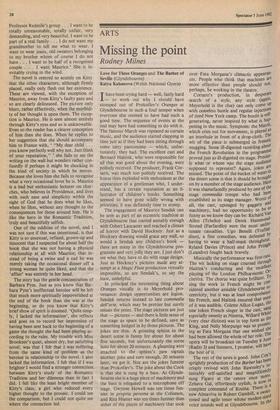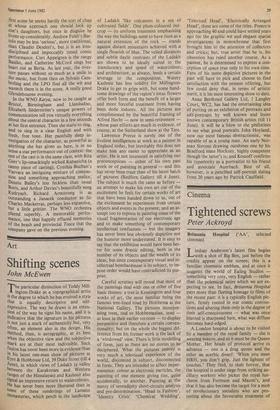ARTS
Missing the point
Rodney Milnes
Katya Kabanova (Welsh National Opera)
I have been trying hard — well, fairly hard to work out why I should have stomped out of Prokofiev's Oranges at Glyndebourne in such a foul temper when everyone else seemed to have had such a good time. The sequence of events at the end may have had something to do with it. The famous March was repeated as curtain music, and the audience started clapping in time just as if they had been sitting through some tatty pantomime — which, unfor- tunately, they had. The excellent cast and Bernard Haitink, who were responsible for all that was good about the evening, were politely received. The producer, Frank Cor- saro, was much too politely received. The house then exploded with enthusiasm at the appearance of a gentleman who, I under- stand, has a certain reputation as an il- lustrator of children's books. Something seemed to have gone wildly wrong with priorities; it was definitely time to stomp.
The engagement of Maurice Sendak can be seen as part of an eccentric tradition at Glyndebourne that started amiably enough with Osbert Lancaster and reached a climax of horror with David Hockney. Just as a Hockney drawing would grace any wall, so would a Sendak any children's book there are many in the Glyndebourne pro- gramme and very jolly they are. I just don't see what they have to do with stage design. Just as Hockney's pictures made any at- tempt at a Magic Flute production virtually impossible, so are Sendak's, to say the least, unhelpful.
In principal the interesting thing about Oranges visually is its Meyerhold pro- venance: design opportunities are legion. Sendak returns instead to late commedia dell'arte, which may be prettier but surely misses the point. The stage pictures are just that — pictures — and there is little sense of the stage as space to be defined, save as something hedged in by those pictures. The jokes are thin. A grinning sphinx in the desert scene is funny for about for about five seconds, but unfortunately the scene lasts for about 20 minutes. A gleaming wire attached to the sphinx's paw signals another joke and sure enough, 20 minutes later, we get it. Nor are the jokes funnier than Prokofiev's. The joke about the Cook is that she is sung by a bass. At Glynde- bourne she is a huge piece of machinery and the bass is relegated to a microphone off stage. Gwynne Howell was ten times fun- nier in propria persona at the Coliseum, and Rita Hunter was ten times funnier than either of the pieces of machinery that took over Fata Morgana's climactic appearan- ces. People who think that machines are more effective than people should not, perhaps, be working in the theatre.
Corsaro's production, in desperate search of a style, any style (again' Meyerhold is the clue) can only come uP with ceaseless bustle and regular injections of tired New York camp. The bustle is self-
generating, never inspired by what is hap- pening in the music. Symptom: the March, which cries out for movement, is played as an interlude in front of a drop-cloth. The
wit of the piece is submerged in frenetic mugging. Some ill-digested rambling about
the French Revolution in the programme proved just as ill-digested on stage. Precise- ly what or whom was the stage audience supposed to represent? Again, jokes are
missed. The point of the bucket of water in the desert scene is that it should be brought
on by a member of the stage audience. Here it was shamefacedly produced by one of the stage commedia troupe who had been
established as its stage manager. Worst of
all, the cast, upstaged by gaggery and machinery, had no opportunity to be as funny as we know they can be: Richard Van Allen (Tchelio) and Derek Hammond' Stroud (Farfarello) were the most unfor- tunate casualties. Ugo Benelli (Truffal" dino), a fine comedian, was defeated by having to wear a half-mask throughout. Ryland Davies (Prince) and John Pringle (Leandro) fought back bravely. Musically the performance was first-rate. The wit lacking on stage coursed through Haitink's conducting and the excellent
playing of the London Philharmonic Or- chestra. The chorus was quite brilliant. To sing the work in French might be con-
sidered another amiable Glyndebourne ec- centricity, but it was at least comprehensi-
ble French, and Haitink ensured that most
of it was audible. Colette Alliot-Lugai, the one token French singer in the cast, sang especially sweetly as Ninetta, Willard White (very clear diction) was in top form as Me King, and Nelly Morpurgo was so PorIlLs: ing as Fata Morgana that one wished she had been allowed the whole of her role. The opera will be broadcast on Tuesday 8 June (Radio 3) and listeners, I promise, will have the best of it. The rest of the news is good. John CO sprightly production of the Barber has been crisply revived with John Rawnsley's imitably self-satisfied and magnificently sung Figaro at the centre once 111°re,,' Zehava Gal, effortlessly stylish, is now 11' complete command of Rosina. There is 3 new Almaviva in Robert Gambill, a sweet- toned and agile tenor whose modest-slzen., voice sounds well at Glyndebourne- In
first scene he seems hardly the sort of chap at whose approach one should lock up one's daughters, but once in disguise he livens up considerably. Andrew Foldi's Bar- tolo may be less 'serious', more traditional, than Claudio Desderi's, but it is an iron- disciplined and impeccably timed comic Performance. Curt Appelgren is the rangy Basilio, and Catherine McCord sings her heart out as Berta. As last year, the over- ture passes without so much as a smile in the music, but from then on Sylvain Cam- breling and the LPO find all the wit and warmth there is in the score. A really good Glyndebourne evening.
In the WNO Katya, now to be caught at Bristol, Birmingham and Llandudno, Elizabeth SoderstrOm's unique powers of Communication tell you virtually everything about the central character in a few seconds at her first entrance. Then she starts to sing, and to sing in a clear English and with fresh, free tone. Her painfully deep in- vestigation of the character, as powerful as anything she has given us here, is in no sense a star performance out of context: the rest of the cast is in the same class, with Rita Gorr's lip-smackingly wicked Kabanicha (a canny piece of casting), Cynthia Buchan's Varvara an intriguing mixture of compas- sion and something approaching malice, Dennis Bailey's less feckless than usual Boris, and Arthur Davies's beautifully sung Kudryash. Richard Armstrong is as outstanding a Janacek conductor as Sir Charles Mackerras, perhaps less expansive, but a little grittier. The WNO orchestra played superbly. A memorable perfor- mance, one that happily effaced memories of the brash and provincial Tosca that the Company gave on the previous evening.







































 Previous page
Previous page